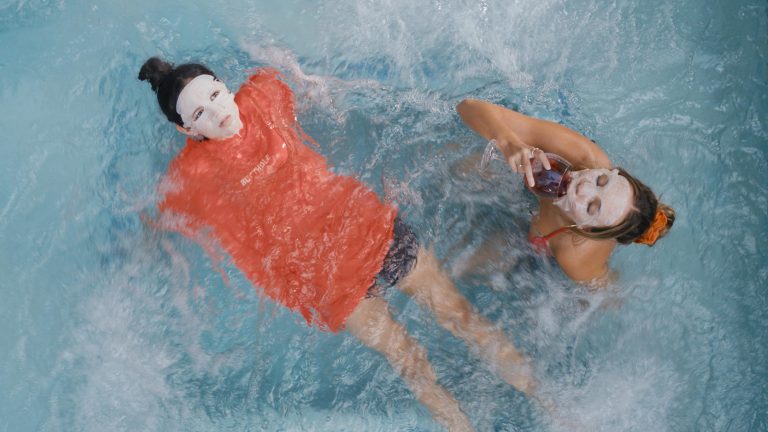
School shootings have, unfortunately, become an all-too-recognizable facet of American society. Their prevalence and the lack of adequate political action taken to curb access to firearms has resulted in the deaths of far too many young people. The effects surviving such an ordeal has on those present when a previously safe zone is invaded have become the subject matter for numerous films and television series, at the risk of gratifying such horrors and wreaking emotional havoc on those who have been traumatized. Megan Park’s feature directorial debut is sensitive and deeply affecting, avoiding problematic clichés in its look at unresolved grief and enduring trauma.
Vada (Jenna Ortega) is in the bathroom when shots ring out and hides in a stall with Mia (Maddie Ziegler), a dancer and aspiring social media influencer she barely knows, and Quinton (Niles Fitch), who has just seen his brother get shot. Reeling from the shock, Vada pushes away her younger sister Amelia (Lumi Pollack), parents (Julie Bowen and John Ortiz), and best friend Nick (Will Ropp) to pursues new friendships with the two people in her life most equipped to understand what it is that she is experiencing.
This film opens like a comedy, with Vada teasing Amelia and joking with Nick. She seems set to make fun of Mia also until things suddenly turn serious, which is jolting in the same way that unexpected developments in life can have stark and irreversible implications. There is a numbness that takes over, leading Vada to drown in her own thoughts, scrolling aimlessly through her news feeds and taking comfort only in the presence of people who aren’t trying to rattle her back to normal.
There is an uneasy lack of clear direction in this film’s narrative that works well since Vada has no idea how to care about things and apply herself in the same way she used to, and she is given a fair degree of freedom not to go back to school and to take time to process. Nick, on the other hand, is intent on linking up with students from other schools to advocate for change, and while he doesn’t judge Vada for not doing the same, he is understandably upset about her need to detach from the familiar and seek solace elsewhere.
Ortega is a remarkable talent, best known previously for TV comedies and horror roles. She first makes Vada seem like a disinterested teenager, intent on putting out an antiestablishment vibe just to make those who seek to control her behavior angry. While that façade remains as she distances herself from the people closest to her, there is monumental depth revealed as she goes through the process of figuring out how to keep going. Ziegler and Fitch offer exactly the support they should as two new faces who ask her for nothing and instead remain in the moment with her, in no rush to get to some state of peace or acceptance.
This film is full of examples of restrained filmmaking, allowing quieter moments to shine and never pushing its narrative to unravel at a faster pace than it should. Certain story arcs might be expected, but this film is set on not following them blindly or fully, capturing the imperfect nature of life that often feels too smoothed-over and finite in cinema. There is no attempt to put forward a solution for how to be in or how to deal with the aftermath of a school shooting, but instead to sit with a state of uncertainty and vulnerability. The result is mesmerizing and haunting, achieving a welcome universality in its refusal to grasp at feeling neat or finite.
Grade: B+
The Fallout made its World Premiere at SXSW Online 2021, where it was awarded the Narrative Feature Competition Grand Jury Award and the Brightcove Illumination Award. It will be distributed by Universal Pictures.

